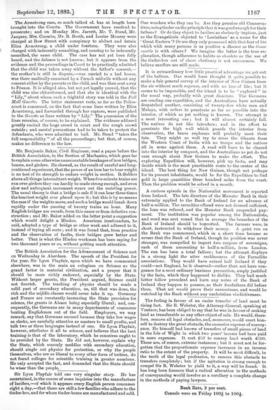Mr. Benjamin Baker, Civil Engineer, read a paper before the
British Association, in the Section of Mechanics, which goes far to explain some otherwise unaccountable breakages of iron bridges, beams, and girders. He showed, as the result of careful and long- continued experiment, that the power of an iron bar to bear weight is no test of its strength to endure weight in motion. It dislikes above all things intermittent weight. When five-minute trains are run over girders they can hardly be made strong enough, and even slow and unfreqnent movement wears out the resisting power. The usual theory is that a bridge is safe if it can bear three times the heaviest weight ever placed upon it ; but this is by no means the case if the weights move, and such a bridge would break down rapidly under the passing of twenty trains an hour. Many English bridges are unsafe, from this cause or from defective con- struction ; and Mr. Baker added on the latter point a suggestion which would delight a Hindoo. American ironfounders, he said, adopted a type of bridge or other work and adhered to it, instead of trying all sorts ; and it was found that, from practice and the observation of faults, their bridges grew better and better. That is what the Hindoo workman has been saying for two thousand years or so, without getting much attention.


































 Previous page
Previous page